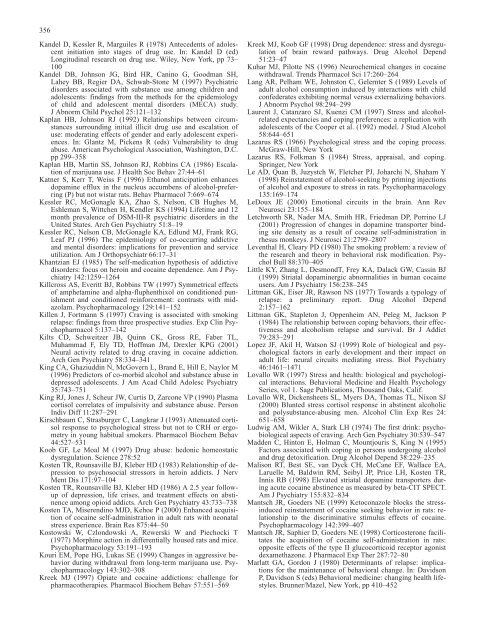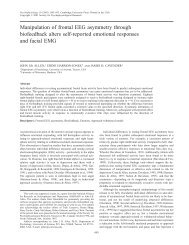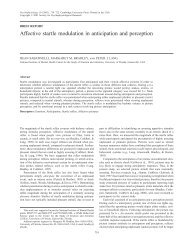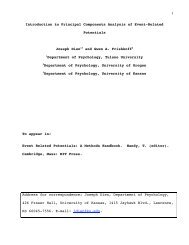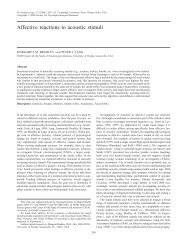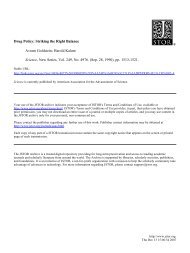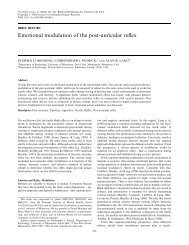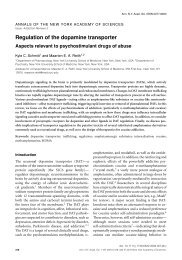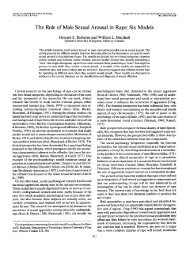How does stress increase risk of drug abuse - Addiction Research ...
How does stress increase risk of drug abuse - Addiction Research ...
How does stress increase risk of drug abuse - Addiction Research ...
You also want an ePaper? Increase the reach of your titles
YUMPU automatically turns print PDFs into web optimized ePapers that Google loves.
356<br />
Kandel D, Kessler R, Marguiles R (1978) Antecedents <strong>of</strong> adolescent<br />
initiation into stages <strong>of</strong> <strong>drug</strong> use. In: Kandel D (ed)<br />
Longitudinal research on <strong>drug</strong> use. Wiley, New York, pp 73–<br />
100<br />
Kandel DB, Johnson JG, Bird HR, Canino G, Goodman SH,<br />
Lahey BB, Regier DA, Schwab-Stone M (1997) Psychiatric<br />
disorders associated with substance use among children and<br />
adolescents: findings from the methods for the epidemiology<br />
<strong>of</strong> child and adolescent mental disorders (MECA) study.<br />
J Abnorm Child Psychol 25:121–132<br />
Kaplan HB, Johnson RJ (1992) Relationships between circumstances<br />
surrounding initial illicit <strong>drug</strong> use and escalation <strong>of</strong><br />
use: moderating effects <strong>of</strong> gender and early adolescent experiences.<br />
In: Glantz M, Pickens R (eds) Vulnerability to <strong>drug</strong><br />
<strong>abuse</strong>. American Psychological Association, Washington, D.C.<br />
pp 299–358<br />
Kaplan HB, Martin SS, Johnson RJ, Robbins CA (1986) Escalation<br />
<strong>of</strong> marijuana use. J Health Soc Behav 27:44–61<br />
Katner S, Kerr T, Weiss F (1996) Ethanol anticipation enhances<br />
dopamine efflux in the nucleus accumbens <strong>of</strong> alcohol-preferring<br />
(P) but not wistar rats. Behav Pharmacol 7:669–674<br />
Kessler RC, McGonagle KA, Zhao S, Nelson, CB Hughes M,<br />
Eshleman S, Wittchen H, Kendler KS (1994) Lifetime and 12<br />
month prevalence <strong>of</strong> DSM-III-R psychiatric disorders in the<br />
United States. Arch Gen Psychiatry 51:8–19<br />
Kessler RC, Nelson CB, McGonagle KA, Edlund MJ, Frank RG,<br />
Leaf PJ (1996) The epidemiology <strong>of</strong> co-occurring addictive<br />
and mental disorders: implications for prevention and service<br />
utilization. Am J Orthopsychiatr 66:17–31<br />
Khantzian EJ (1985) The self-medication hypothesis <strong>of</strong> addictive<br />
disorders: focus on heroin and cocaine dependence. Am J Psychiatry<br />
142:1259–1264<br />
Killcross AS, Everitt BJ, Robbins TW (1997) Symmetrical effects<br />
<strong>of</strong> amphetamine and alpha-fluphenthixol on conditioned punishment<br />
and conditioned reinforcement: contrasts with midazolam.<br />
Psychopharmacology 129:141–152<br />
Killen J, Fortmann S (1997) Craving is associated with smoking<br />
relapse: findings from three prospective studies. Exp Clin Psychopharmacol<br />
5:137–142<br />
Kilts CD, Schweitzer JB, Quinn CK, Gross RE, Faber TL,<br />
Muhammad F, Ely TD, H<strong>of</strong>fman JM, Drexler KPG (2001)<br />
Neural activity related to <strong>drug</strong> craving in cocaine addiction.<br />
Arch Gen Psychiatry 58:334–341<br />
King CA, Ghaziuddin N, McGovern L, Brand E, Hill E, Naylor M<br />
(1996) Predictors <strong>of</strong> co-morbid alcohol and substance <strong>abuse</strong> in<br />
depressed adolescents. J Am Acad Child Adolesc Psychiatry<br />
35:743–751<br />
King RJ, Jones J, Scheur JW, Curtis D, Zarcone VP (1990) Plasma<br />
cortisol correlates <strong>of</strong> impulsivity and substance <strong>abuse</strong>. Person<br />
Indiv Diff 11:287–291<br />
Kirschbaum C, Strasburger C, Langkrar J (1993) Attenuated cortisol<br />
response to psychological <strong>stress</strong> but not to CRH or ergometry<br />
in young habitual smokers. Pharmacol Biochem Behav<br />
44:527–531<br />
Koob GF, Le Moal M (1997) Drug <strong>abuse</strong>: hedonic homeostatic<br />
dysregulation. Science 278:52<br />
Kosten TR, Rounsaville BJ, Kleber HD (1983) Relationship <strong>of</strong> depression<br />
to psychosocial <strong>stress</strong>ors in heroin addicts. J Nerv<br />
Ment Dis 171:97–104<br />
Kosten TR, Rounsaville BJ, Kleber HD (1986) A 2.5 year followup<br />
<strong>of</strong> depression, life crises, and treatment effects on abstinence<br />
among opioid addicts. Arch Gen Psychiatry 43:733–738<br />
Kosten TA, Miserendino MJD, Kehoe P (2000) Enhanced acquisition<br />
<strong>of</strong> cocaine self-administration in adult rats with neonatal<br />
<strong>stress</strong> experience. Brain Res 875:44–50<br />
Kostowski W, Czlondowski A, Rewerski W and Piechocki T<br />
(1977) Morphine action in differentially housed rats and mice.<br />
Psychopharmacology 53:191–193<br />
Kouri EM, Pope HG, Lukas SE (1999) Changes in aggressive behavior<br />
during withdrawal from long-term marijuana use. Psychopharmacology<br />
143:302–308<br />
Kreek MJ (1997) Opiate and cocaine addictions: challenge for<br />
pharmacotherapies. Pharmacol Biochem Behav 57:551–569<br />
Kreek MJ, Koob GF (1998) Drug dependence: <strong>stress</strong> and dysregulation<br />
<strong>of</strong> brain reward pathways. Drug Alcohol Depend<br />
51:23–47<br />
Kuhar MJ, Pilotte NS (1996) Neurochemical changes in cocaine<br />
withdrawal. Trends Pharmacol Sci 17:260–264<br />
Lang AR, Pelham WE, Johnston C, Gelernter S (1989) Levels <strong>of</strong><br />
adult alcohol consumption induced by interactions with child<br />
confederates exhibiting normal versus externalizing behaviors.<br />
J Abnorm Psychol 98:294–299<br />
Laurent J, Catanzaro SJ, Kuenzi CM (1997) Stress and alcoholrelated<br />
expectancies and coping preferences: a replication with<br />
adolescents <strong>of</strong> the Cooper et al. (1992) model. J Stud Alcohol<br />
58:644–651<br />
Lazarus RS (1966) Psychological <strong>stress</strong> and the coping process.<br />
McGraw-Hill, New York<br />
Lazarus RS, Folkman S (1984) Stress, appraisal, and coping.<br />
Springer, New York<br />
Le AD, Quan B, Juzystch W, Fletcher PJ, Joharchi N, Shaham Y<br />
(1998) Reinstatement <strong>of</strong> alcohol-seeking by priming injections<br />
<strong>of</strong> alcohol and exposure to <strong>stress</strong> in rats. Psychopharmacology<br />
135:169–174<br />
LeDoux JE (2000) Emotional circuits in the brain. Ann Rev<br />
Neurosci 23:155–184<br />
Letchworth SR, Nader MA, Smith HR, Friedman DP, Porrino LJ<br />
(2001) Progression <strong>of</strong> changes in dopamine transporter binding<br />
site density as a result <strong>of</strong> cocaine self-administration in<br />
rhesus monkeys. J Neurosci 21:2799–2807<br />
Leventhal H, Cleary PD (1980) The smoking problem: a review <strong>of</strong><br />
the research and theory in behavioral <strong>risk</strong> modification. Psychol<br />
Bull 88:370–405<br />
Little KY, Zhang L, DesmondT, Frey KA, Dalack GW, Cassin BJ<br />
(1999) Striatal dopaminergic abnormalities in human cocaine<br />
users. Am J Psychiatry 156:238–245<br />
Littman GK, Eiser JR, Rawson NS (1977) Towards a typology <strong>of</strong><br />
relapse: a preliminary report. Drug Alcohol Depend<br />
2:157–162<br />
Littman GK, Stapleton J, Oppenheim AN, Peleg M, Jackson P<br />
(1984) The relationship between coping behaviors, their effectiveness<br />
and alcoholism relapse and survival. Br J Addict<br />
79:283–291<br />
Lopez JF, Akil H, Watson SJ (1999) Role <strong>of</strong> biological and psychological<br />
factors in early development and their impact on<br />
adult life: neural circuits mediating <strong>stress</strong>. Biol Psychiatry<br />
46:1461–1471<br />
Lovallo WR (1997) Stress and health: biological and psychological<br />
interactions. Behavioral Medicine and Health Psychology<br />
Series, vol 1. Sage Publications, Thousand Oaks, Calif.<br />
Lovallo WR, Dickensheets SL, Myers DA, Thomas TL, Nixon SJ<br />
(2000) Blunted <strong>stress</strong> cortisol response in abstinent alcoholic<br />
and polysubstance-abusing men. Alcohol Clin Exp Res 24:<br />
651–658<br />
Ludwig AM, Wikler A, Stark LH (1974) The first drink: psychobiological<br />
aspects <strong>of</strong> craving. Arch Gen Psychiatry 30:539–547<br />
Madden C, Hinton E, Holman C, Mountjouris S, King N (1995)<br />
Factors associated with coping in persons undergoing alcohol<br />
and <strong>drug</strong> detoxification. Drug Alcohol Depend 38:229–235<br />
Malison RT, Best SE, van Dyck CH, McCane EF, Wallace EA,<br />
Laruelle M, Baldwin RM, Seibyl JP, Price LH, Kosten TR,<br />
Innis RB (1998) Elevated striatal dopamine transporters during<br />
acute cocaine abstinence as measured by beta-CIT SPECT.<br />
Am J Psychiatry 155:832–834<br />
Mantsch JR, Goeders NE (1999) Ketoconazole blocks the <strong>stress</strong>induced<br />
reinstatement <strong>of</strong> cocaine seeking behavior in rats: relationship<br />
to the discriminative stimulus effects <strong>of</strong> cocaine.<br />
Psychopharmacology 142:399–407<br />
Mantsch JR, Saphier D, Goeders NE (1998) Corticosterone facilitates<br />
the acquisition <strong>of</strong> cocaine self-administration in rats:<br />
opposite effects <strong>of</strong> the type II glucocorticoid receptor agonist<br />
dexamethazone. J Pharmacol Exp Ther 287:72–80<br />
Marlatt GA, Gordon J (1980) Determinants <strong>of</strong> relapse: implications<br />
for the maintenance <strong>of</strong> behavioral change. In: Davidson<br />
P, Davidson S (eds) Behavioral medicine: changing health lifestyles.<br />
Brunner/Mazel, New York, pp 410–452


